The Pantheon is one of the most visited monuments in Rome and an architectural wonder that has stood strong since ancient Roman times. Why was it built? Read about why the Eternal City’s best-preserved monument is so celebrated. Here is the story of the Pantheon in Rome!
Pro Tip: Planning what to do on your trip to Rome? Bookmark this post in your browser so you can easily find it when you’re in the city. See our guide to Rome for more planning resources, our top Rome tours for a memorable trip, and the best things to do in Rome.
A Brief History of Rome’s Pantheon
The Pantheon in Rome is an exceptional example of ancient architecture that still leaves visitors in awe to this day. As you prepare to visit the Pantheon, read this brief history so you can fully appreciate this incredible monument. Tickets can be purchased on site, but if you’re looking for a stress-free visit with an expert guide, why not join us on our skip-the-line Pantheon guided tour?
For after your visit, check out the best places to eat and the top things to do near the Pantheon. Here’s what we’ll cover:
- History of the Pantheon’s Construction and Reconstruction
- Who built the Pantheon?
- What is a Pantheon?
- The architecture of the Pantheon
- Why is the Pantheon famous?
- Why does the Pantheon have a hole?
- What was the Pantheon used for?
- Pantheon tickets
- Where is the Pantheon in Rome?
Not ready to book a tour? See if Rome tours are worth it.
History of the Pantheon’s Construction and Reconstruction
According to Amanda Claridge, the Pantheon was first built between 27-25 B.C., but that building would not be recognizable today. The first structure was built by Marcus Agrippa, a Roman Consul under the first Emperor of Rome—Ceaser Augustus. The original structure was built primarily out of wood and subsequently burnt down about 100 years later in A.D. 80.
Domitian took a second shot at it. The structure was struck by lightning and consequently burnt to the ground in A.D. 110. At the time, these incidents would have come across as very bad omens for Rome during what was otherwise a prosperous time. Lightening was controlled by Jupiter (Zeus), and if it struck the building, it would likely signify he was unhappy with it or the Romans in general.
Trajan, emperor at the time, would have likely begun the structure and Hadrian would have finished it. Hadrian was a great emperor and very humble, so he didn’t dedicate the structure to himself—something he only did once. Instead, he dedicated it to the man who originally built it: Marcus Agrippa. We’ll get to that when we go over the porch.
Who built the Pantheon? Many believe the architect responsible is Apollodorus of Damascus, but this again is speculation. We do know that Hadrian commissioned renovations on the Pantheon, which were completed between A.D. 125 and A.D. 128. Onto a brief history and use of the Pantheon.
History of the Pantheon
A.D. 609:
The Pantheon was converted into a church by Pope Boniface IV. A rough history states that Christians complained about being plagued by pagan ghosts that haunted the building. So, it was converted into a church.
A.D. 663:
The structure would have been adorned with a world of riches after its third and final construction—a very different from the building you see today. In Roman times, you would likely have seen a shimmering bronze-covered outer dome. That bronze was removed by Constans the II and lead has since replaced it for protection.
There was also likely bronze on the interior of the dome, which would have been removed and repurposed in Rome. Troops sacking the city would have not taken the effort to build a 44.4M structure to take bronze off the interior of the dome. Instead, it’s much more likely that easy-to-grab riches would have been their focus.
16th Century:
Raphael was buried here by request, along with a few other artists and architects such as Baldassare Peruzzi.
17th Century:
Two bell towers were added to the front of the Pantheon to give it more of a church-like look. Pope Urban VIII (Barberini) takes significant material from the Pantheon including bronze which adorned the ceiling of the portico.
This is where the phrase, “What the barbarians did not do the Barberini did” comes from. It refers to the barbarians who sacked Rome in antiquity taking most of its wealth. The bronze went to Bernini’s famous Baldacchino in St. Peter’s Basilica.
1833:
Raphael’s tomb was opened up and examined to quell rumors that his body was not inside. They were proven incorrect upon medical inspection. In the same century, the two Bernini bell towers were removed from the Pantheon, which would be Bernini’s second bell-tower fiasco in Rome.
19th Century:
The first and only kings of Italy, Vittorio Emmanuelle II and Umberto I, found their final resting place inside the Pantheon.
Popular Rome Tours
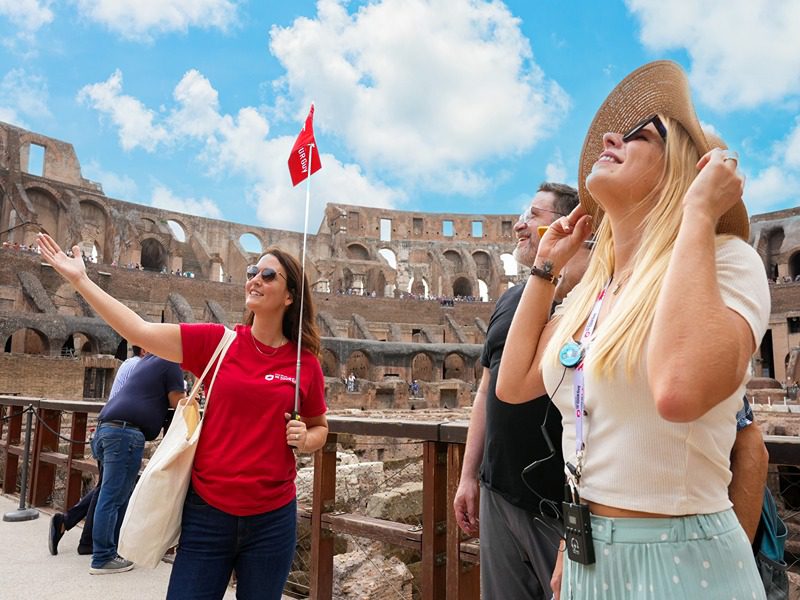
Best-Selling Tour
Rome in a Day Tour with Colosseum and Vatican Museums
Seeing the best of Rome in a single day might seem like a big undertaking, but our expertly designed tour makes it effortless with skip-the-line tickets, included transportation, and engaging guides to lead the way. In just 7 hours, you’ll visit renowned sites like the Sistine Chapel, Colosseum, Trevi Fountain, and Pantheon. With fascinating stories at every stop, you can skip the stress and immerse yourself in the vibrant heritage and culture of Rome all in one remarkable day.
See Prices
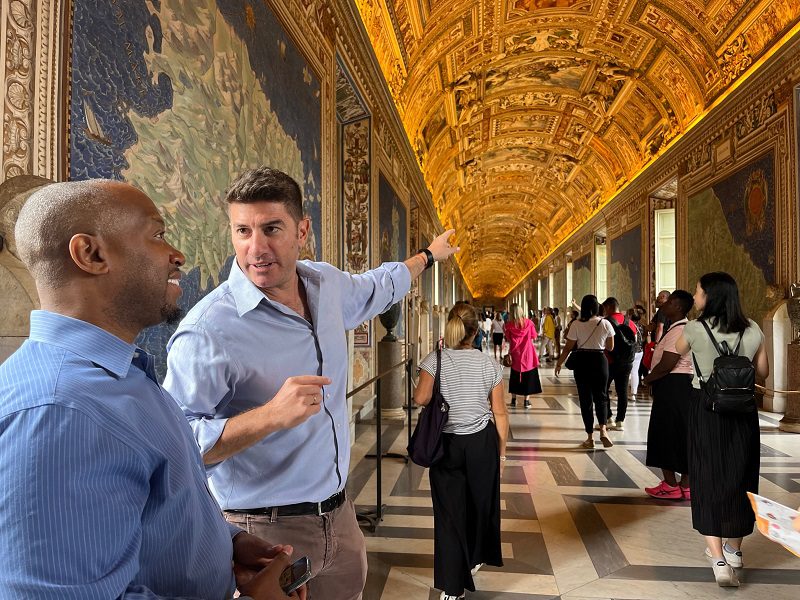
Best Price!
Privileged Entrance Vatican Tour with Sistine Chapel
Without the right access, visiting the Vatican means fighting crowds, long waits, and missing the most significant rooms and works of art. Our privileged entrance tour offers more than just entry—it’s an immersive experience led by a storytelling guide who brings the Vatican to life. Skip the line and explore the Vatican Museums, including the Raphael Rooms and the Sistine Chapel, with engaging insights that make each moment memorable and meaningful.
See Prices
Not ready to book a tour? Check out our best Rome tours to take and why.
Who Built the Pantheon?
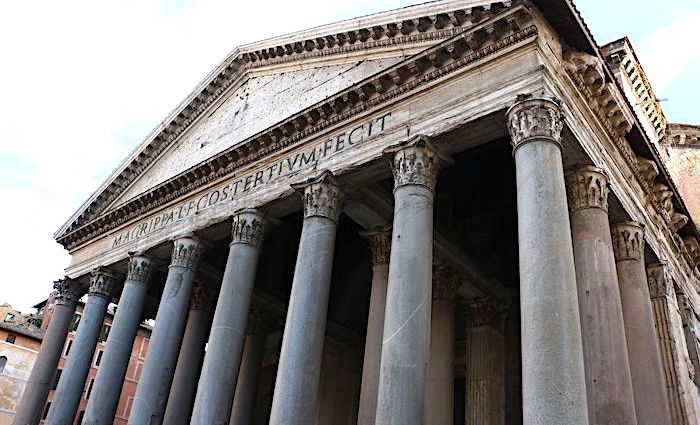
Records state it was originally built in 27 B.C. How do we know? Well, the inscription on the front of the structure reads: “M·AGRIPPA·L·F·COS·TERTIVM·FECIT.”
If you don’t know Latin, it means, “Marcus Agrippa, son of Lucius, made [this building] when consul for the third time.” Marcus Agrippa, general of the Roman legions, was Emperor Octavian Augustus’s best buddy.
However, it’s important to note that what we see today is the reconstruction done by Emperor Hadrian around A.D. 120. This means the Pantheon in Rome (as we see it now) is almost 19 centuries old!
What Is a Pantheon?
The mystical name of the Pantheon derives from the Greek adjective that means “honor all gods.” In fact, the Pantheon was built as a temple dedicated to the worship of pagan Roman gods.
In A.D. 609, Pope Boniface IV and Emperor Phocas converted it into the Christian church we see now. Today, the Pantheon currently conducts Mass on Saturdays and Sundays. So, if you’d like to attend mass at the Pantheon, you can.
During the Hellenistic period, the name Pantheon had a very clear meaning. A temple dedicated to a deified king and other gods associated with him.
Filippo Coarelli, professor of Roman Antiquities at Perugia University
The Architecture of the Pantheon
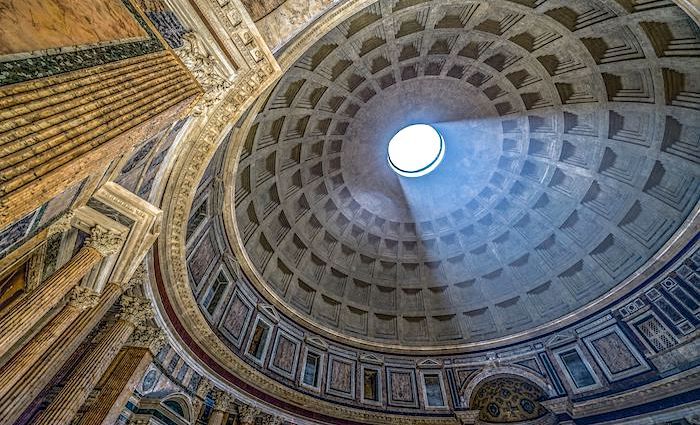
To begin with, let’s start with the exterior of the Pantheon in Rome. Its portico is built in the Greek style; Emperor Hadrian was a Grecophile. The columns are hard to miss, standing 40 feet high and measuring five feet in diameter. Gazing at the facade of the building will give you shivers, but wait until you see what’s on the inside.
The Pantheon is considered a rotunda, a circular drum structure. Perfect mathematically, the Pantheon’s dome has an opening in the center. To put it in numbers, the sphere’s height is equal to the radius at 43.3 meters (142 feet). In fact, the Pantheon in Rome still holds the world record for having the largest unsupported concrete dome.
Why Is the Pantheon Famous?
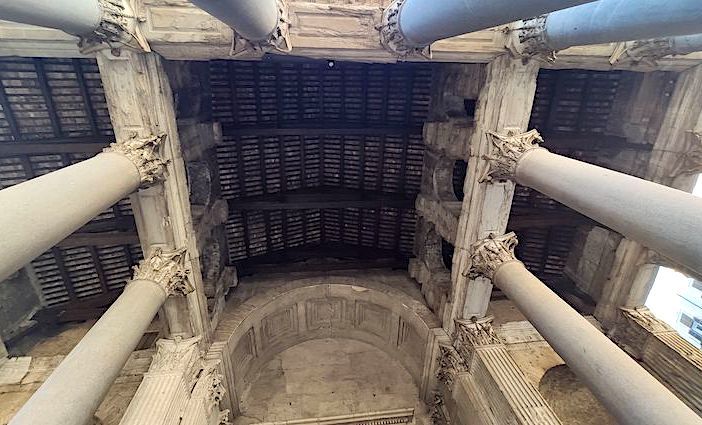
As you walk inside the Pantheon, remember that people have been walking into the Pantheon for the last 1,900 years! If that doesn’t impress you, probably nothing will.
How many other examples of ancient buildings do you know of where you can say that? Exactly, I can’t think of any either.
The building itself gives you one of those rare insights into what ancient life and architecture would have been like. So, not only is this building extremely important for modern-day archeology, but also for regular people like us who love to dream about what life was like back in the day.
When entering the building from the portico outside, you can’t see the original bronze decorations above the pillars. This is because the great Lorenzo used the material to create the Baldacchino in St. Peter’s Basilica. In addition to its importance in ancient Rome, the Pantheon is home to important tombs.
In fact, the great Italian painter and architect Raphael rests here. The inscription on his crypt translates to “In life, Nature feared to be outdone by him. In death, she feared too she would die.” As epitaphs go, that’s pretty impressive!
Top Colosseum Tours
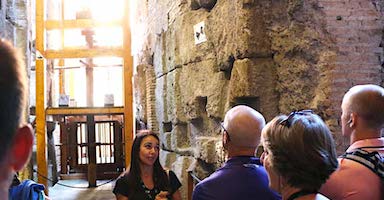
Best Seller
Colosseum Underground Tour with Roman Forum and Palatine Hill
Only 2% of visitors to the Colosseum are able to see the Underground, making tours a rare, exclusive experience. Our tours give you access to the Underground, Arena Floor, and first and second tiers—areas most people never see. Skip the line and enjoy priority access, guided by an expert who brings the Colosseum’s rich history to life. These spots sell out quickly, so don’t wait—secure your place now for this unforgettable opportunity.
See Prices
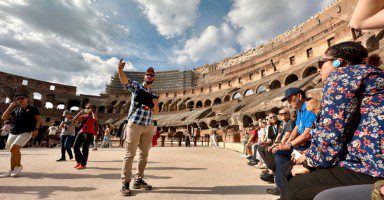
Customer Favorite
Special Access Colosseum Arena Floor Tour Through the Gladiator’s Gate
Reaching the Colosseum’s Arena Floor is no easy feat; tickets sell out quickly, leaving most visitors stuck in crowded corridors with limited views. With us, bypass the lines and enter through the Gladiator’s Gate to stand on the Arena Floor, giving you a front-row view of Rome’s nearly 2,000-year-old symbol of power and glory. With your friendly guide, uncover the Colosseum’s brutal past, then continue to the Roman Forum and Palatine Hill to explore the epicenter of ancient Roman life.
See Prices
Not ready to book a tour? Find out if Rome tours are worth it.
Why Does the Pantheon Have a Hole?
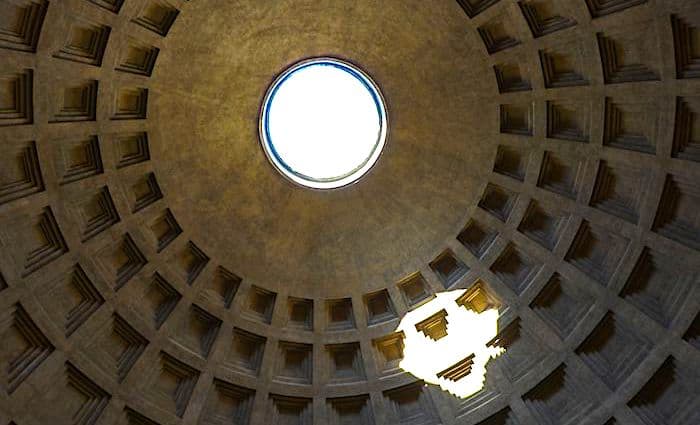
The opening in the center is known as the oculus or “eye” in Latin. Despite its religious symbolism as the “window to the other world,” the purpose of the opening is of extreme importance for the engineering and stability of the Pantheon. Also, the oculus is the only source of natural light in the building.
At noon on April 21 (Rome’s birthday), when the sun is at the equinox, a beam of sunlight enters through the Pantheon’s Oculus and exits through the grille above the entrance gate.
As a result, the light passes through the grille and lights up a courtyard. To put into perspective how mind-blowing this is, imagine how the ancient Romans built the Pantheon to create this effect 2,000 years ago.
What Was the Pantheon Used For?
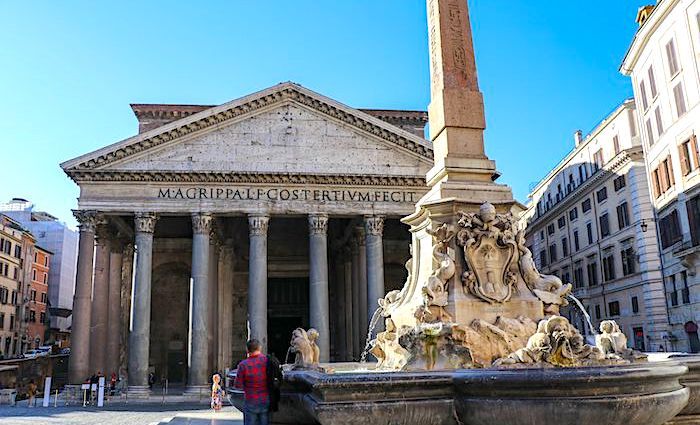
According to Amanda Claridge, the Pantheon was one of the places where Emperor Hadrian held court. He would sit on a public tribunal, hear petitions, and give judgments. We also hear of an imperial edict being read out in Pantheo in A.D. 368 or 370.
So, while the original building was used as a dynastic temple to the Julio-Claudian family, by the time of Hadrian, he was using it as a seat for certain government functions. Imagine him sitting on a public tribunal inside of this massive dome. He must have made quite an impression!
In A.D. 609, the Byzantine Emperor Phocas gave to Pope Boniface IV the Pantheon who turned it into a church—S. Maria ad Martyres.
From this time in the Middle Ages to the present, the Pantheon has been allowed to survive and we get to admire it in all its jaw-dropping splendor. In my opinion, it is only when you can see a building such as the Pantheon that you understand how amazing the Ancient Roman Empire really was.
The Arval Brethren in 59 AD would meet here. The Arval Brethren was a college of 12 priests who made regular vows for the well-being of the imperial family. They would meet under the porch of the Pantheon instead of the porch of the Temple of Imperial Harmony in the Roman Forum.
Oxford Archeological Guide by Amanda Claridge
Pantheon Tickets
You may be wondering how much it costs to visit the Pantheon. You’ll be happy to know that there’s no need to buy Pantheon Rome tickets—there’s no admission charge to enter.
And while it probably won’t take you very long to look around, it’s probably a good idea to consider renting an audio guide at the desk near the entrance to make the most of your visit.
If you’d like to visit the Pantheon, consider a Rome in day tour and visit the Pantheon and other sites with an expert guide or an e-bike Rome tour for a fun way to see this incredible site, in addition to most of the other major attractions in Rome.
Not ready to book a tour? Check out our best Rome tours to take and why.
Where Is the Pantheon in Rome?
Short Answer: Center of Rome
How long to get there from other famous sites?
- Spanish Steps: 15-minute walk
- The Trevi Fountain: 10-minute walk
- Piazza Navona: 5-minute walk
Address: Piazza Della Rotonda | Opening Hours: Monday to Saturday 9 am to 7:15 pm; and Sunday from 9 am to 12:45 pm.
Getting Around in Pedestrian Areas
In order to see the Pantheon, you’ll have to come on foot. In the center of Rome, they have what is called a ZTL, which is an Italian abbreviation that means that only local residents are allowed to drive in this area with a special permit. You can take a taxi that will drop you off nearby, but you’ll still have about a 5-minute walk from any direction.
One of the magical things about the center of Rome is that there is no rhyme or reason for the way the streets were made. One theory is that after Rome was defeated back in the 4th century B.C. by the Gauls, they rebuilt the city so fast that it resulted in the haphazard streets you see today.
Not ready to book a tour? Check out our best Rome tours to take and why.
Here’s Where To Stay in Italy’s Most Popular Destinations
Rome, Florence, Venice, Amalfi Coast, and Capri

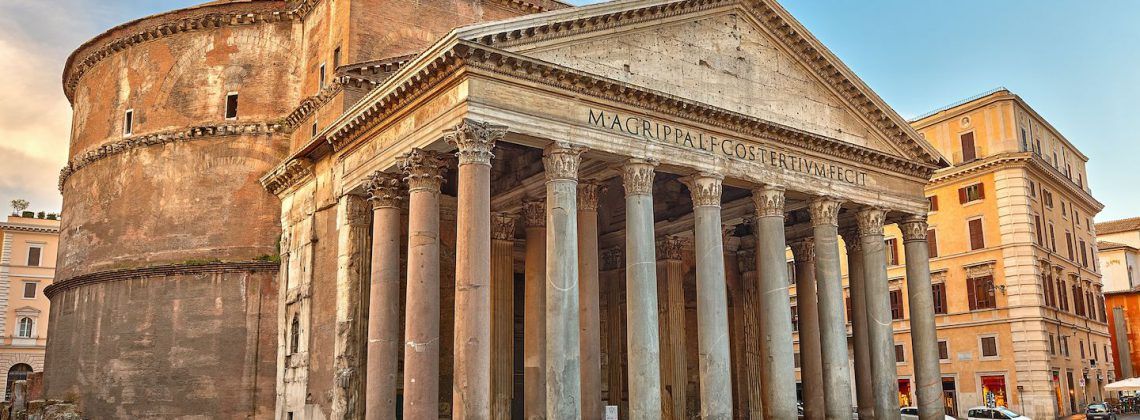
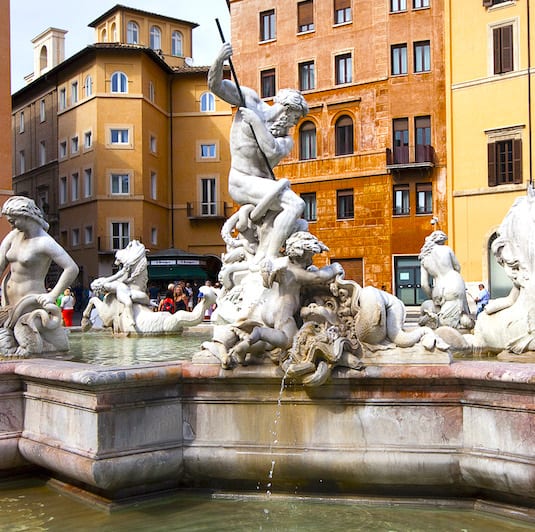
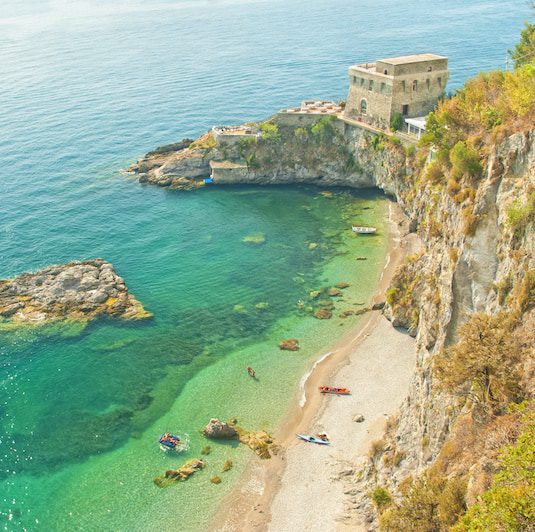
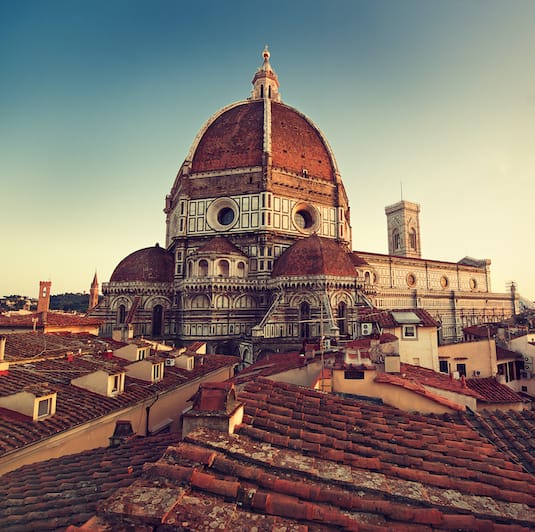
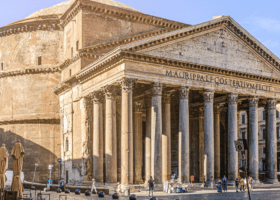
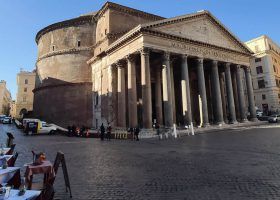
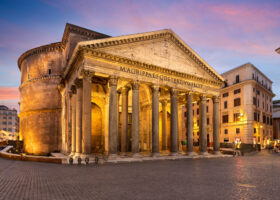


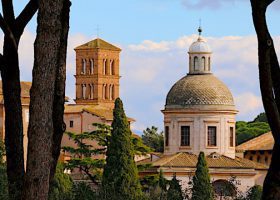
Beautiful blog